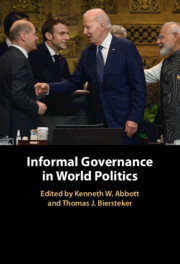Book contents
- Informal Governance in World Politics
- Informal Governance in World Politics
- Copyright page
- Contents
- Figures
- Tables
- Contributors
- Preface
- Acknowledgments
- Abbreviations
- Part I Introduction
- Part II Informality of Institutions
- 2 From Complex Interdependence to Complex Governance
- 3 Soft Pooling
- 4 Informal Governance in the Development Regime
- 5 Informal Governance of International Climate Policy
- 6 Why Do States Cooperate Informally?
- Part III Informality within Institutions
- Part IV Informality around Institutions
- Part V Normative Issues
- Part VI Conclusion
- References
- Index
3 - Soft Pooling
How IIGOs Govern Collective Decision-making without Delegation
from Part II - Informality of Institutions
Published online by Cambridge University Press: 23 May 2024
- Informal Governance in World Politics
- Informal Governance in World Politics
- Copyright page
- Contents
- Figures
- Tables
- Contributors
- Preface
- Acknowledgments
- Abbreviations
- Part I Introduction
- Part II Informality of Institutions
- 2 From Complex Interdependence to Complex Governance
- 3 Soft Pooling
- 4 Informal Governance in the Development Regime
- 5 Informal Governance of International Climate Policy
- 6 Why Do States Cooperate Informally?
- Part III Informality within Institutions
- Part IV Informality around Institutions
- Part V Normative Issues
- Part VI Conclusion
- References
- Index
Summary
Scholars often conflate the concepts of pooling (how states make collective decisions) and delegation (authorizing an international body to act) in examining the authority of intergovernmental organizations (IGOs). We clarify the difference by showing how states “soft pool” decision-making through informal intergovernmental organizations (IIGOs) without creating legal obligations or delegating authority. IIGOs such as the G-groups are growing in prevalence and importance because soft pooling allows states to make collective decisions that are politically binding in nonlegal ways. We examine organizational characteristics of IIGOs that allow states to minimize sovereignty costs while cooperating through soft pooling – including the use of consensus to express shared expectations through declarations and memoranda of understanding and administrative structures such as rotating chairs to avoid delegating to an independent secretariat. We review these understudied organizational alternatives, explaining how soft pooling makes IIGOs authoritative even as states retain sovereignty.
Keywords
- Type
- Chapter
- Information
- Informal Governance in World Politics , pp. 53 - 73Publisher: Cambridge University PressPrint publication year: 2024



